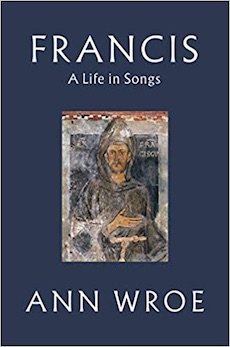By Allen Boyer
In bright, taut lines of verse, English writer Ann Wroe offers a biography of St. Francis of Assisi, a book worth reading as Advent lights the way to Christmas. The book unfolds in scenes and stanzas: “because it struck me,” Wroe comments, that the life of Francis “was a life lived in poetry rather than prose.” Presented as songs, these scenes recall Giotto’s murals, and Flaubert’s prose-poem imagery in “The Legend of St Julian the Hospitaller,” and the early poems of Ezra Pound, the student of Cavalcanti who saw beauties on the crowded Métro as petals on a dark wet bough.
Each song, each scene from Francis’s life, opens by quoting early reports of the saint’s ministry and preaching. Two poems then follow, Wroe explains: “the first an evocation of Francis at this point, the second a reflection of this aspect of him in the modern world. A short grace-note, a Franciscan echo in Nature . . . links each subject to the next.”
The chroniclers’ anecdotes are well chosen. They catch Francis in his roles as preacher, pastor, clown, and visionary—a man who could confront demons, but panicked when surrounded by nuns. Wroe’s poems reimagine these moments and find equivalents. “Scissors” describes the cropping of St. Clare’s of Assisi’s hair, shorn off when she followed Francis and made her profession. A sermon from May 1213, which Francis began with a troubadour’s song—and other sermons in which Francis skipped and danced with elation—find a rhyme in a thought of brass fanfare. To resist sinful thoughts, Francis once threw himself into a thorn-hedge, which flowered with deep-pink thornless roses. Wroe rhymes that scene with an image of a garden in Romney Marsh. “No adjectives can frame them, / Nor any grid of poetry or prose;/ we catch their beauty only as we name them,/ rose, rose.”
The rhythm is loose, and the rhymes can be irregular; they emerge when it matters. Here Wroe recalls Francis preaching to the birds:
“You preached by starlight to night birds.
A dozen came. They perched along
The gilded branches of a tree
Like jeweler’s stock. . .
“They did not stir. Perhaps each phrase
Slid off their smooth enameled backs
Like rain, like night. Yet on one limb
Set separately the wisest bird,
Wide-eyed and cowled, weighed every word.”
The book ends with an envoi. It sees the temporal and the eternal with the acuity of “Little Gidding,” but it sounds in a brighter key.
“Where pilgrims mill and stare and photograph
a young friar trots in with a watering-can
and genuflects. The lilies in their vase
need water, or they die like any man.
“Drab in the holidaying crowd, mute brown
as earth itself, he sinks upon his knees
before the leaves. For us, such falling down
may seem abasement; but for him the ease
“of sandalled everyday. Above him, see,
against hard blue, slim shining lilies flower
in painted clay, immortal as he’ll be
also, beyond this place, this hour.”
Wroe worked for the BBC and is currently obituaries editor for The Economist. Her first book was Lives, Lies, and the Iran-Contra Affair; since then she has written on Shelley, Pontius Pilate, the late-medieval pretender Perkin Warbeck, and vision: Six Facets of Light, which meditated on sunlight, painting, and the chalk-backboned landscape of southern England. Talking to the Times Literary Supplement, Hilary Mantel called Wroe the most underrated contemporary writer—“she lights up every subject she touches.” The songs and poetry of this book are thoughtful, spiritual, and lively: worthy tributes to the showman-preacher who staged the first manger scene.
Allen D. Boyer (ΦBK, Vanderbilt University), a lawyer and writer in New York City, is the author of Sir Edward Coke and the Elizabethan Age. He is currently at work on a history of the law of treason in England. Vanderbilt University is home to the Alpha of Tennessee Chapter of Phi Beta Kappa.




